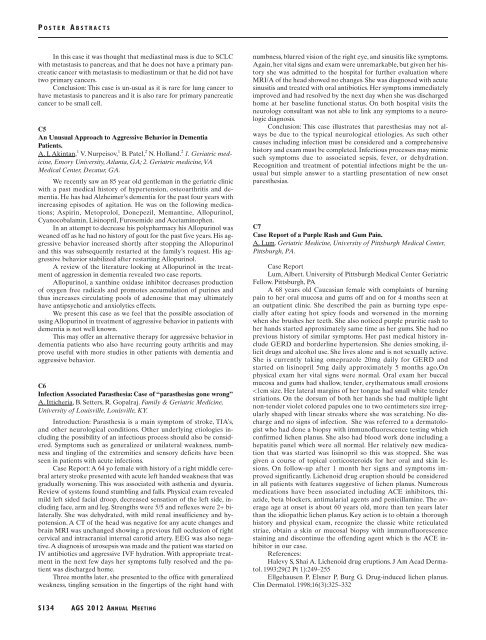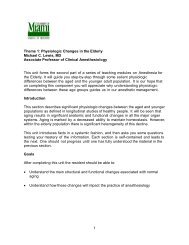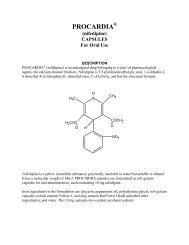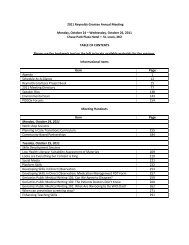Here - American Geriatrics Society
Here - American Geriatrics Society
Here - American Geriatrics Society
You also want an ePaper? Increase the reach of your titles
YUMPU automatically turns print PDFs into web optimized ePapers that Google loves.
P OSTER<br />
A BSTRACTS<br />
In this case it was thought that mediastinal mass is due to SCLC<br />
with metastasis to pancreas, and that he does not have a primary pancreatic<br />
cancer with metastasis to mediastinum or that he did not have<br />
two primary cancers.<br />
Conclusion: This case is un-usual as it is rare for lung cancer to<br />
have metastasis to pancreas and it is also rare for primary pancreatic<br />
cancer to be small cell.<br />
C5<br />
An Unusual Approach to Aggressive Behavior in Dementia<br />
Patients.<br />
A. I. Akintan, 1 V. Nurpeisov, 1 B. Patel, 2 N. Holland. 2 1. Geriatric medicine,<br />
Emory University, Atlanta, GA; 2. Geriatric medicine, VA<br />
Medical Center, Decatur, GA.<br />
We recently saw an 85 year old gentleman in the geriatric clinic<br />
with a past medical history of hypertension, osteoarthritis and dementia.<br />
He has had Alzheimer’s dementia for the past four years with<br />
increasing episodes of agitation. He was on the following medications;<br />
Aspirin, Metoprolol, Donepezil, Memantine, Allopurinol,<br />
Cyanocobalamin, Lisinopril, Furosemide and Acetaminophen.<br />
In an attempt to decrease his polypharmacy his Allopurinol was<br />
weaned off as he had no history of gout for the past five years. His aggressive<br />
behavior increased shortly after stopping the Allopurinol<br />
and this was subsequently restarted at the family’s request. His aggressive<br />
behavior stabilized after restarting Allopurinol.<br />
A review of the literature looking at Allopurinol in the treatment<br />
of aggression in dementia revealed two case reports.<br />
Allopurinol, a xanthine oxidase inhibitor decreases production<br />
of oxygen free radicals and promotes accumulation of purines and<br />
thus increases circulating pools of adenosine that may ultimately<br />
have antipsychotic and anxiolytics effects.<br />
We present this case as we feel that the possible association of<br />
using Allopurinol in treatment of aggressive behavior in patients with<br />
dementia is not well known.<br />
This may offer an alternative therapy for aggressive behavior in<br />
dementia patients who also have recurring gouty arthritis and may<br />
prove useful with more studies in other patients with dementia and<br />
aggressive behavior.<br />
C6<br />
Infection Associated Parasthesia: Case of “parasthesias gone wrong”<br />
A. Itticheria, B. Setters, R. Gopalraj. Family & Geriatric Medicine,<br />
University of Louisville, Louisville, KY.<br />
Introduction: Parasthesia is a main symptom of stroke, TIA’s,<br />
and other neurological conditions. Other underlying etiologies including<br />
the possibility of an infectious process should also be considered.<br />
Symptoms such as generalized or unilateral weakness, numbness<br />
and tingling of the extremities and sensory deficits have been<br />
seen in patients with acute infections.<br />
Case Report: A 64 yo female with history of a right middle cerebral<br />
artery stroke presented with acute left handed weakness that was<br />
gradually worsening. This was associated with asthenia and dysuria.<br />
Review of systems found stumbling and falls. Physical exam revealed<br />
mild left sided facial droop, decreased sensation of the left side, including<br />
face, arm and leg. Strengths were 5/5 and reflexes were 2+ bilaterally.<br />
She was dehydrated, with mild renal insufficiency and hypotension.<br />
A CT of the head was negative for any acute changes and<br />
brain MRI was unchanged showing a previous full occlusion of right<br />
cervical and intracranial internal carotid artery. EEG was also negative.<br />
A diagnosis of urosepsis was made and the patient was started on<br />
IV antibiotics and aggressive IVF hydration. With appropriate treatment<br />
in the next few days her symptoms fully resolved and the patient<br />
was discharged home.<br />
Three months later, she presented to the office with generalized<br />
weakness, tingling sensation in the fingertips of the right hand with<br />
numbness, blurred vision of the right eye, and sinusitis like symptoms.<br />
Again, her vital signs and exam were unremarkable, but given her history<br />
she was admitted to the hospital for further evaluation where<br />
MRI/A of the head showed no changes. She was diagnosed with acute<br />
sinusitis and treated with oral antibiotics. Her symptoms immediately<br />
improved and had resolved by the next day when she was discharged<br />
home at her baseline functional status. On both hospital visits the<br />
neurology consultant was not able to link any symptoms to a neurologic<br />
diagnosis.<br />
Conclusion: This case illustrates that paresthesias may not always<br />
be due to the typical neurological etiologies. As such other<br />
causes including infection must be considered and a comprehensive<br />
history and exam must be completed. Infectious processes may mimic<br />
such symptoms due to associated sepsis, fever, or dehydration.<br />
Recognition and treatment of potential infections might be the unusual<br />
but simple answer to a startling presentation of new onset<br />
paresthesias.<br />
C7<br />
Case Report of a Purple Rash and Gum Pain.<br />
A. Lum. Geriatric Medicine, University of Pittsburgh Medical Center,<br />
Pittsburgh, PA.<br />
Case Report<br />
Lum, Albert. University of Pittsburgh Medical Center Geriatric<br />
Fellow. Pittsburgh, PA<br />
A 68 years old Caucasian female with complaints of burning<br />
pain to her oral mucosa and gums off and on for 4 months seen at<br />
an outpatient clinic. She described the pain as burning type especially<br />
after eating hot spicy foods and worsened in the morning<br />
when she brushes her teeth. She also noticed purple pruritic rash to<br />
her hands started approximately same time as her gums. She had no<br />
previous history of similar symptoms. Her past medical history include<br />
GERD and borderline hypertension. She denies smoking, illicit<br />
drugs and alcohol use. She lives alone and is not sexually active.<br />
She is currently taking omeprazole 20mg daily for GERD and<br />
started on lisinopril 5mg daily approximately 5 months ago.On<br />
physical exam her vital signs were normal. Oral exam her buccal<br />
mucosa and gums had shallow, tender, erythematous small erosions<br />

















